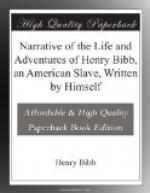This idea of utter helplessness, in perpetual bondage, is the more distressing, as there is no period even with the remotest generation when it shall terminate.
CHAPTER II.
A fruitless effort for education.—The Sabbath among Slaves.—Degrading amusements.—Why religion is rejected.—Condition of poor white people.—Superstition among slaves.—Education forbidden.
In 1833, I had some very serious religious impressions, and there was quite a number of slaves in that neighborhood, who felt very desirous to be taught to read the Bible. There was a Miss Davis, a poor white girl, who offered to teach a Sabbath School for the slaves, notwithstanding public opinion and the law was opposed to it. Books were furnished and she commenced the school; but the news soon got to our owners that she was teaching us to read. This caused quite an excitement in the neighborhood. Patrols[1] were appointed to go and break it up the next Sabbath. They were determined that we should not have a Sabbath School in operation. For slaves this was called an incendiary movement.
The Sabbath is not regarded by a large number of the slaves as a day of rest. They have no schools to go to; no moral nor religious instruction at all in many localities where there are hundreds of slaves. Hence they resort to some kind of amusement. Those who make no profession of religion, resort to the woods in large numbers on that day to gamble, fight, get drunk, and break the Sabbath. This is often encouraged by slaveholders. When they wish to have a little sport of that kind, they go among the slaves and give them whiskey, to see them dance, “pat juber,” sing and play on the banjo. Then get them to wrestling, fighting, jumping, running foot races, and butting each other like sheep. This is urged on by giving them whiskey; making bets on them; laying chips on one slave’s head, and daring another to tip it off with his hand; and if he tipped it off, it would be called an insult, and cause a fight. Before fighting, the parties choose their seconds to stand by them while fighting; a ring or a circle is formed to fight in, and no one is allowed




